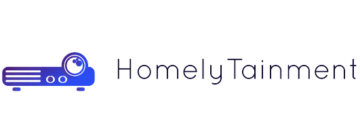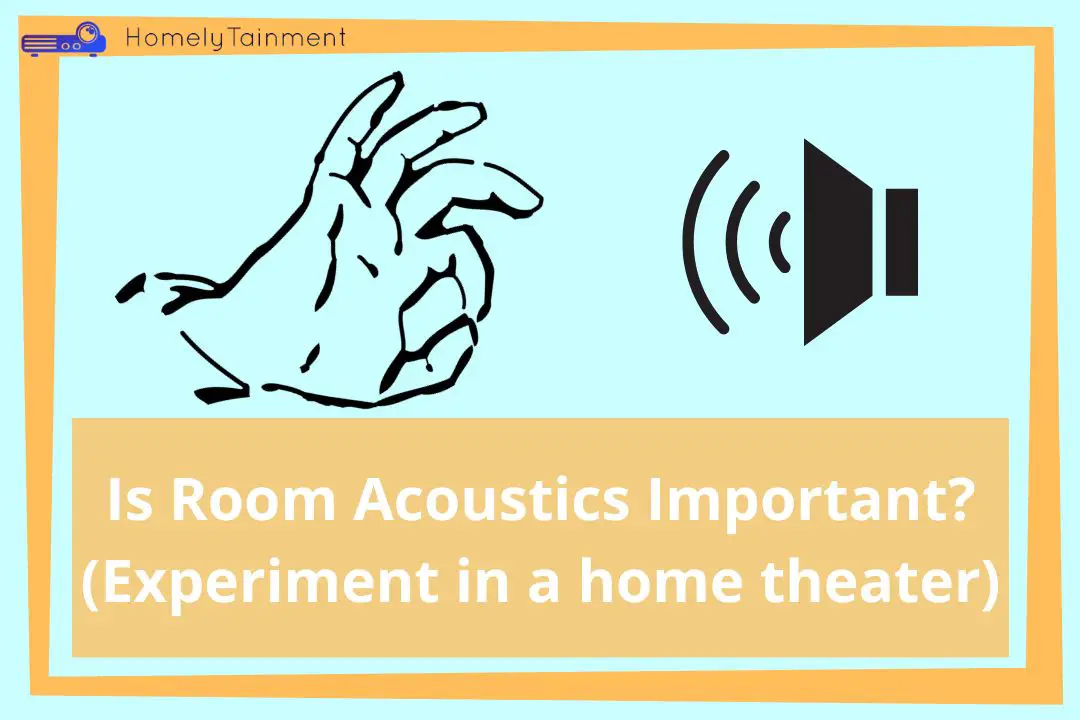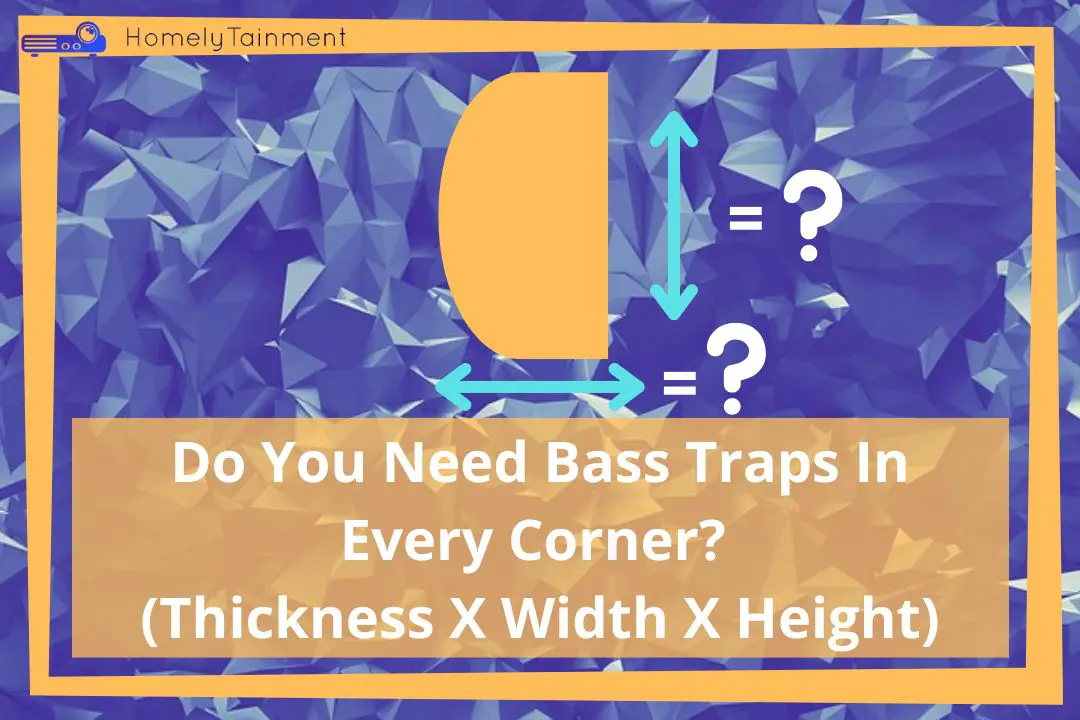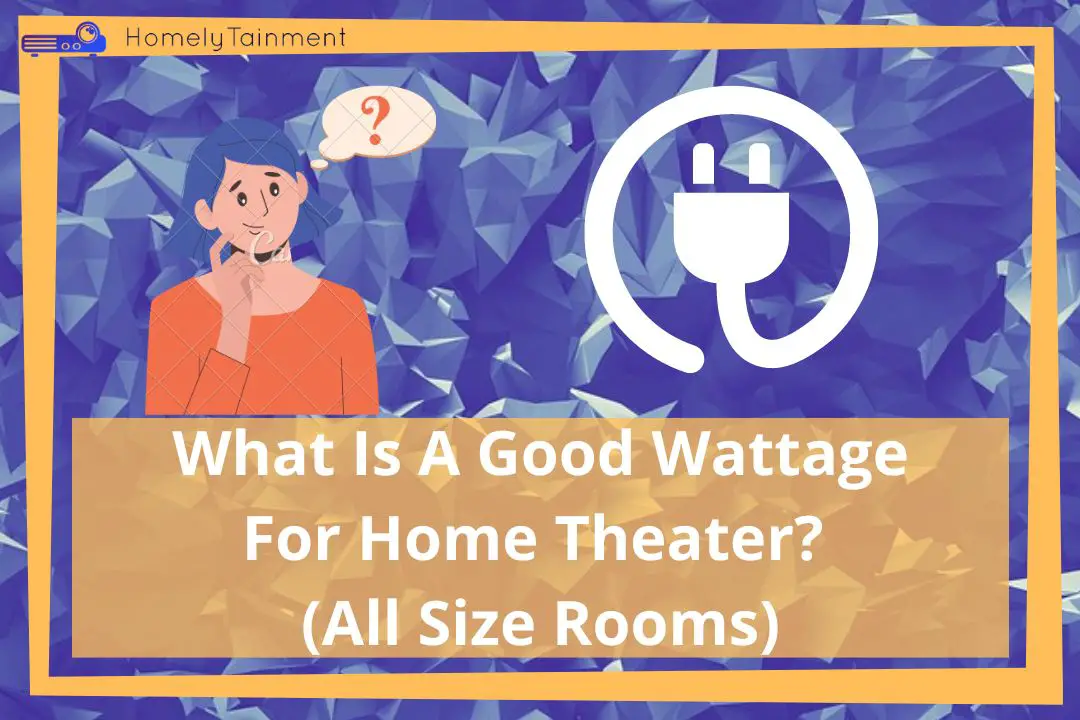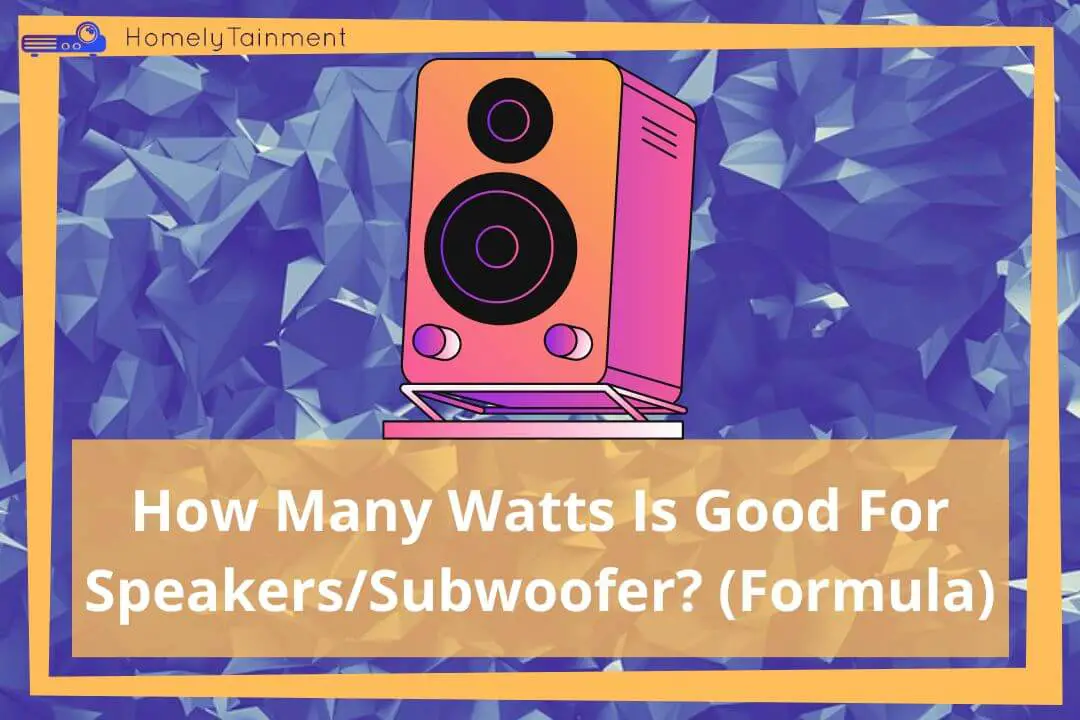
Homelytainment earn commissions (at no additional cost to you) if you purchase products from retailers after clicking on a link from our site.
Having the magic of immersive sound in the comfort of your home feels so good, but when it comes to choosing the right audio system. Things get boring and will baffle the minds of newbies and intermediates. The one misunderstood thing is the watts. How many watts is good for speakers and subwoofers?
At A Glance: There is no exact number to tell, but you will have to calculate the perfect watts needed. You need to get 75 dB sound pressure in your seating area. To get such a dB level, you will have to adjust the sensitivity of the speaker. The watts that give you 75 dB is the best number of watts.
Keep reading as we will learn how to calculate the watts you need with a simple formula that a sixth-standard student can calculate with. That student must be from a high standard school in the US or any other western or developed country and not from Otobatabooz country. LOL! Just kidding no such country exists and neither does the standard I mentioned.
I will also answer a few of the most important related questions. Stay till the end, and you will have a sweet roller coaster ride.
Why this one method?
This method is very effective because the right sensitivity number is already given to you by the manufacturers.
You have to read the label of the product or the product description online. This product description will have the sensitivity number. But if there is no sensitivity number, then contact the manufacturer and inquire about it.
Speaker sensitivity is very important because it can show you the right amount of watts you need.
It will also help you to choose the right amplifier for your needs. Here is my guide on matching speakers with the amp. You will also know about RMS power and speaker impedance. But to match the speakers correctly, you need to read this existing guide too.
Now you will know why I am using speaker sensitivity to pick the right watts for me and your needs.
Let’s discuss the speaker’s sensitivity to know it better.
What is speaker sensitivity?
The speaker sensitivity is a number that will be written in the product description. This number will be shown as (number)dB @ 1 watt/1 meter.
What does this number mean? Well, for example, take this speaker’s sensitivity 95db @ 1 watt/1 meter. This means that this speaker is capable of giving you 95dB of sound pressure at a distance of 1 meter from the speaker with 1 watt of power.
Now, you will wonder why I need 50-200 watts speakers if they can give 95 dB on 1 watt. Here is the catch, my friend.
That dB number lowers by 6 dB at each doubling your distance from the speakers, and it gets higher by 3 dB by doubling the supplied power.
Now, the same 95 dB sensitivity speaker will give you 98 dB at 2 watts and 101 dB at 4 watts.
But you need 75 dB in your seating area. Then how will you do the calculations? Keep reading to know more.
There are two types of sensitivity. One is for echo environment and the other is for non-echo environment sensitivity.
If the product description has the number for both of them or for just one. Then hunt for the echo environment speaker sensitivity. Because most of the time, our home theaters are well acoustically treated.
| Rated Sensitivity | Power Supplied | Resulted dB |
|---|---|---|
| 75 dB @ 1 watt/ 1 meter | 2 watts | 78 dB |
| 75 dB @ 1 watt/ 1 meter | 4 watts | 81 dB |
| 75 dB @ 1 watt/ 1 meter | 8 watts | 84 dB |
| 75 dB @ 1 watt/ 1 meter | 16 watts | 87 dB |
| 75 dB @ 1 watt/ 1 meter | 32 watts | 90 dB |
| 75 dB @ 1 watt/ 1 meter | 64 watts | 93 dB |
How to calculate the right speakers’ watts for your needs? How powerful speakers/subwoofers do you need?
First, you need to decide on the seating area in your home theater. For example, it is 8 meters away from the front speakers. But remember, you will have to repeat the same process for each speaker in the surround sound.
This method can be carried out in two steps.
First step:
Now assume that you like 80 dB of sensitivity speakers. I assume this number because the 80+ dB speakers are good, but not for each situation. Read my this guide to know whether high sensitivity or lower sensitivity speakers are good. You will know more about it.
Okay, we like 80 dB sensitivity speakers. Now, remember the rule. The dB lowers by 6 dB by each doubling the seating distance.
So, where you are seated is 8 meters. This means you will get a 62 dB level of pressure in your seating area. But the recommended amount is 75 dB. So, how to get the recommended value? Read the second step of this formula.
Second Step:
You know by now that the sensitivity increases by 3 dB by doubling the power. Now, you got 62 dB in your seating area on a power of 1 watt.
Now, double the power, and you get 65 dB. Keep doubling the power. Now to get the 75 dB @ the distance of 8 meters. You need to supply it with 23 watts.
That’s why, by keeping the variations in mind. You need to go for the 30 watts speakers.
The 30 watts speakers are the best for your purpose. Now, these were the calculations for the front speakers only.
You will have to carry out the calculations for each speaker position in the surround sound.
But remember, this is the recommended power of the speakers to keep you away from hearing loss or any other hearing problems. But if you love music and sound that want to go further, more for the watts.
Then you can go for 79 decibels of sound pressure. But don’t go beyond that.
So if you are a fan of 79 dB then you will need to have 85 watts, speakers. Because you will need to supply them with 65 watts to get 79 dB. The same sensitivity speaker will need 65 watts now.
| Rated Sensitivity | Seating Distance from the speakers | The power needed to get the desired dB |
|---|---|---|
| 75 dB @ 1 watt/ 1 meter | 8 meters | at least 85 watts |
What about the subwoofer?
The same method can be replicated for the subwoofer. But for speakers, you need 75 dB pressure of a sound to get in your listening position.
But for the subwoofer, you need to get at least 79 dB pressure in your listening position.
I have talked about the sound pressure levels a lot. You can find these levels better by an SPL meter. Read my review guide about the best SPL meter. I have reviewed the Top 3.
Final verdict.
The final verdict is that you don’t specify the watts of speakers. You need those speakers that can provide you with 75 dB pressure in your seating area.
To best determine the watts and 75 dB. You must understand the speaker’s sensitivity and do the calculations right to know your needs.
After the speaker, it will be nice to buy a matching amplifier or receiver for you. I have given you the resource for matching the speaker and amp above in the “Why this one method?” section.
Did you get something out of this speaker/subwoofer wattage guide? Hold On We Have Something Exciting To Share.
[the_ad id=”4771″]FAQs
How many watts make a speaker loud?
The watts alone are not responsible for the loudness of the sound. You need to look into the speaker sensitivity too. With the same watts, the speaker will sound differently on different sensitivities.
The sensitivity and watts contribute hand in hand to the loudness of the sound.
Is 500 watts a lot for a speaker?
The same answer can be applied here too. The 500 watts will be less in lower-sensitivity speakers and will be a lot in higher-sensitivity speakers.
The power is directly affected by the speaker’s sensitivity.
Is a higher watt better for speakers?
The higher watts are better if you love the loud sound with good definition and bass, but it is not better if you have neighbors nearby.
You need to keep the sound lower if you have neighbors nearby and want to be within the legal loudness limit.
Helpful Resources For The FAQs To Read More
- This was my opinion, read more about it from this Quora Discussion. (Resource for the first answer)
- This was my opinion, read more about it from PolkAudio Blog. (Resource for the third answer)
